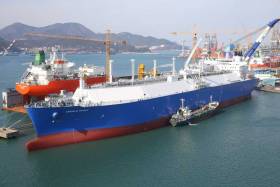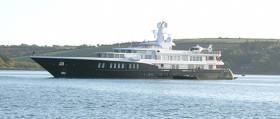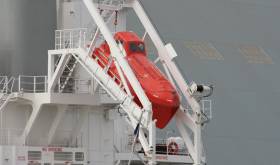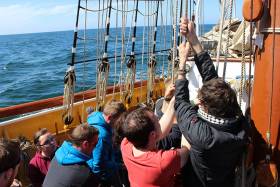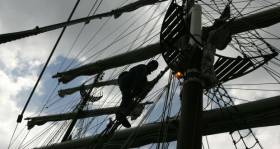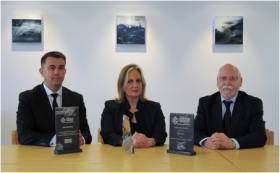Displaying items by tag: National Maritime College of Ireland
Paul Hegarty Named as New Maritime College Head
The current Commanding Officer of the Naval Service ship, L.E. James Joyce, Paul Hegarty, has been appointed the new Head of the National Maritime College of Ireland (NMCI) at Ringaskiddy in Cork Harbour.
He has extensive experience in the Naval Service and holds a PhD in Change Management from MTU, an MA in Defence Studies from King's College, London, an MSc in Project Management from the University of Limerick, a HDip in Geographic Information Systems from UCC, and a BSc in Nautical Science from Cork Institute of Technology (NMCI).
He will be responsible for the overall academic and administrative leadership of NMCI.
The 2023 seamanship competition for senior Sea Scouts, supported by the Irish Institute of Master Mariners, occurred on 5 March at the National Maritime College of Ireland in Cork Harbour.
24 young people from around Ireland competed for the Captain Desmond Fortune Founders Award and the Captain Cian Timmons Memorial Award. The competition has run since 1995. This was the first time the Captain Cian Timmons Memorial Award was presented for the highest-placing Rover Scout. Captain Timmons was a Sea Scout and a member of the Council of the Irish Institute of Master Mariners.
Competitors were examined on a range of seamanship skills, including testing their knowledge of maritime safety legislation, sea survival and collision regulations. They represented Sea Scout groups in Ringsend, New Ross, Howth, Malahide, Dollymount and the Scout Group in Ballykelly in Co Wexford.
 Sea Scout Master Mariners awards were presented by the Irish Institute of Master Mariners and the Chief Scout of Scouting Ireland, Jill Pitcher Farrell
Sea Scout Master Mariners awards were presented by the Irish Institute of Master Mariners and the Chief Scout of Scouting Ireland, Jill Pitcher Farrell
The examiner pool was diverse and included Sea Scout leaders and external examiners with experience as professional mariners and as members of the Naval Service, Irish Coast Guard and the RNLI. They also included representatives from Irish Sailing and lecturers from the NMCI.
Participants were also treated to a full day experience on 4 March, touring the NMCI, the Naval Base at Haulbowline, and Crosshaven Lifeboat Station, before bedding down in the community garden campsite of the local Crosshaven Sea Scouts.
Awards were presented by the Irish Institute of Master Mariners and the Chief Scout of Scouting Ireland, Jill Pitcher Farrell.
Results
Venture Scouts
Captain Desmond Fortune 'Founders Award'
- 1st - Cormac Eason - 9th Port Malahide Sea Scouts
- 2nd - Dan Clohessy - 9th Port Malahide Sea Scouts
- 3rd - Adam Kavanagh - 12th Wexford Ballykelly Scouts
Rover Scouts
Captain Cian Timmons Memorial Award
- 1st - Óran Ó hIrile - 9th Port Malahide Sea Scouts
- 2nd - Evan Banable - 9th Port Malahide Sea Scouts
- 3rd - Darragh Ryan - 1st Wexford New Ross Sea Scouts
Dan Clohessy won the Eoghan Lavelle Cox'ns Prize for achieving the highest marks in the practical section.
Teekay Gas Partners with National Maritime College of Ireland in Cadetship Programme
As part of their recruitment strategy, Teekay Gas, one of the largest independent vessel owners in the world, have engaged in a cadet programme with the National Maritime College of Ireland (NMCI), with the objective of forming sustainable seafarer opportunities. In the first year, there will be 12 cadet sponsorships. These include; five deck, five engine, and two electrical cadets. This is an exciting time for Teekay Gas and the relationship established with NMCI ensures that the fleet will be supported with highly skilled Deck, Engineering and Electrical Officers as the company continues to grow.
Teekay Shipping was established in 1973 by Torben Karlshoej whose initials now form the company name. Teekay LNG is a global operator with offices on every continent. The operations centre for LNG is delivered from their office in Scotland, with their corporate headquarters located in Vancouver, Canada. Teekay has also expanded across new business areas to include not only oil but LNG and Offshore Production and Storage across four publicly traded companies on the New York Stock Exchange.
Teekay Shipping entered the LNG market in 2004 with the acquisition of 4 LNG Vessels. The company has experienced steady growth and now own and operate a total of 27 LNG vessels. These 27 vessels include:
9 steam turbine vessels
4 slow speed diesel with full reliquification plant 11 DFDE/TFDE
3 MEGI
Over the next 3 years Teekay will be expanding its fleet by another 13 vessels. Within this expansion will be x6 ARC7 ice breakers, the world’s first. The first ice breaker, the Eduard Toll, will deliver in January, 2018.
“Securing the relationship with Teekay LNG is another giant leap forward for not only the NMCI but for Maritime Ireland. Officer cadetships of this quality means that young Irish men and women can pursue well paid, high-end, challenging careers with one of the world’s leading blue-chip energy companies, the opportunities within TK are virtually limitless. For Ireland Inc. this is an opportunity to develop the country’s maritime expertise in the expanding LNG trades, ensuring that we have Irish decision makers and influencers in seagoing and shore-based roles in the coming years, supporting the future of the NMCI and our offshore and port sectors”. says Conor Mowlds, Head of the National Maritime College of Ireland
“Teekay Gas have a proven track record of integrity and commitment, relying on the delivery of excellent cadet and officer based training across their LNG fleet to guarantee continued success. As Maritime Industry Liaison Officer, I’m excited with the opportunity to partner with one of the world’s largest independent owners and operators of LNG carriers and we are thrilled to be part of such a wonderful gain for the NMCI and its entire student cohort” added Annette Coughlan - Maritime Industry Liaison Officer, National Maritime College of Ireland.
Given the recent increases in cadet intake, and the expansion of the Chevron Cadet Programme, the return of Shell, continued support from the Cruise Line operators, not to mention exciting companies such as Ardmore and D’Amico the NMCI is certainly setting the pace when it comes to Cadet training.
National Maritime College of Ireland Steers a Course for Superyacht Success
In a move to broaden the base of its operations even further, and capitalise on the ever growing global Superyacht market, the National Maritime College of Ireland (NMCI) has made significant investments in developing its course programmes for this exciting sector. That investment paid dividends as the College’s new Superyacht Division has secured approval from the Private Yachting Association (PYA) to complement its existing programmes for deck and engine crew right up to Masters Qualification.
Joey Meen, PYA Director, CEO GUEST Programme said,“We are delighted to announce that the NMCI is now a GUEST accredited Training Provider offering the introduction levels of the GUEST programme. NMCI have easily met the required standards for approval under the PYA GUEST Guidelines offering huge value to the students with their professional facilities and qualified trainers.
NMCI staff and trainers are committed to ensuring that their students training for interior yacht crew positions have the continued support and relevant education they need. The training offered will give confidence and skills sets to enhance individual careers as well as bringing value to the interior departments on-board.
NMCI are now one of the 20 plus GUEST accredited training providers worldwide, who will be working with us to maintain standards of education and learning outcomes for the students’ investment. They are very much welcomed into the GUEST entity and we look forward to working with them in the years to come."
Jim O’Byrne, Head of NMCI Services continued, “This recent PYA approval was the final link in the chain to enable us to offer qualified Irish citizens out in to the Private Yacht arena, and to facilitate the existing cohort of seafarers currently enjoying employment in this sector”
CIT President, Dr Barry O’Connor, congratulated the team at the NMCI for once again securing international recognition and validation for the high standards and on-going relevance of the education and training programmes being offered. The NMCI has once again identified, and effectively responded to, the needs of a growing niche area in the maritime sector. Such successes secure the positive future of the NMCI and sustain the established reputation of Cork Institute of Technology as a responsive and agile institution identifying and serving specific evolving needs of enterprise and of communities generally.
Sea Survival Training Course Dispute Moves To High Court
#CourseDispute - A top maritime college’s dispute with Irish marine authorities over the approval of sea survival refresher training has reached the High Court, as the Irish Examiner reports.
The National Maritime College of Ireland, under the Cork Institute of Technology, argues that the refusal by Transport Minister Shane Ross to approve its refresher courses could see it facing claims for almost €1 million in course fees.
As previously reported on Afloat.ie, all commercial mariners were required to have completed a programme of mandatory refresher training in basic sea survival by the start of this year.
But the NMCI claimed a submission it made in early 2015 for its relevant courses — provided in a joint venture with SEFtec Global Training Ireland Limited at a cost of €800 per individual — was not approved by the department, putting jobs at risk.
Now that joint venture, SNO, is making a legal challenge against the Department of Transport’s refusal to recognise its certificates — noting that a recent Marine Notice regarding ‘approved’ training is “wholly irrational” and allegedly breaches EU regulations.
The Irish Examiner has much more on the story HERE.
Tall Ship Celebrations for Cork Sail Training Bursary Scheme
32 young people from all backgrounds and a range of abilities across Cork City and County who have completed Tall Ship voyages aboard the Cork-Based Vessel Spirit of Oysterhaven and the Dutch Tall Ship Morgenster during the 2016 season will celebrate their achievements in Cork today.
The voyages were made possible by the assistance of a group of sponsors including Port of Cork, Cork City Council, Cork County Council, EMC, Ardmore Shipping, The Institute of Master Mariners and the National Maritime College of Ireland.
Due to extra support from Port of Cork, Cork County Council and Cork City Council Morgenster made a visit to Cork in June and hosted events and “open-ship” for public visits in Cork City and in Cobh during the Cork Harbour Festival 2016.
13 trainees from the City and County sailed the ship over 12 days from Belfast, via Isle of Man to Cork. Another 3 Cork trainees sailed from Cork to Amsterdam over 19 days arriving in Amsterdam at the end of June. These trainees formed part of groups with up-to 32 trainees and mentors on each voyage which were part funded using EU “Erasmus +” funding and involved active educational programmes of youth development as part of “Youth Exchange” projects.
The Cork Sail Training Bursary Scheme was established in 2014 to provide access to Sail Training voyages on tall ships and large sailing vessels for young people from the region. Now in its third year the scheme is one of the largest and most active on the Island of Ireland and runs in parallel with similar schemes now in operation under Sail Training Ireland in Belfast, Drogheda, Dublin, Waterford, Wexford, Limerick and Galway. The participants are nominated through a network of youth and community groups in Cork and places are available to young people from all backgrounds and with all abilities.
The scheme has supported approximately 50 trainees since 2014 and looks likely to grow from strength to strength over the coming years.
Also present on the day will be trainees sponsored under one of Sail Training Ireland’s “SafeHaven Voyages” sponsored by “Arthur Cox”. Their voyage on board the “Spirit of Oysterhaven” finishes today, following six days at sea beginning in Glandore County Cork. The vessel will be in Port of Cork and open to visitors after the event.
“The whole experience since we first met until the last moment I will never forget. The scenery, the sea sickness, the lifestyle and most of all the people I spent this journey with. I’ve made some lovely friends and will never forget them.” Cork Trainee 2015.
MC for the event is RTE Radio “SeaScapes” Presenter Marcus Connaughton (Goodwill Ambassador for Sail Training Ireland) and the certificates will be presented to trainees by Commodore Hugh Tully - Flag Officer Commanding Naval Service (F.O.C.N.S.). The Naval Service is a strong supporter of Sail Training for young people as a stepping stone into maritime careers and has recently made the Naval Yacht “Creidne” available for voyages for young people selected by Sail Training Ireland.
Approval of Maritime Course Delayed ‘Puts Jobs at Risk’
#CourseDispute -The National Maritime College of Ireland is in dispute with marine authorities in that it is putting the livelihoods of up to 400 seafarers and over 20 lecturers at risk, it is claimed.
The Irish Times writes that from January 1st next year, all mariners will be required to have completed a programme of mandatory refresher training in basic sea survival, boat-handling and firefighting.
However, the Cork-based National Maritime College of Ireland says a submission it made a year and a half ago for approval of its refresher courses has yet to receive formal approval from Irish authorities.
While the college says the UK’s Marine and Coastguard Agency has recognised the certificates since last August, the Irish equivalent – the Marine Survey Office – has refused to do so.
Further coverage of the story can be read here.
National Maritime College of Ireland Recognised for Consistency in Academic Excellence
At the 2016 Irish Logistics and Transport Award ceremony, the National Maritime College of Ireland (NMCI) were, for the third year in succession, recognised for their excellence in educational programmes, and were awarded the prestigious Education award for their Bachelor of Business degree in Supply Chain Management. This annual gala event in Dublin, attended by over five hundred delegate representatives from the supply chain and logistics management sector, gathered to celebrate the best of what their industry has to offer. Jane O’Keeffe, course director of Supply Chain, proudly collected the award on behalf of the NMCI.
NMCI is a constituent college of Cork Institute of Technology (CIT) and focuses on both maritime and non-maritime industry sectors, and offers customised education and training programmes to meet individual requirements. The Bachelor of Business in Supply Chain Management degree programme is designed to support industry requirements, and for those with experience in logistics and supply chain management, who wish to further their career prospects.
This unique programme, in its ninth year, builds upon the students’ experiential knowledge and provides grounding in a wide and diverse range of disciplines. To date graduates have experienced excellent employment and career progression opportunities in both indigenous and multi-national organisations. The programme has been so successful within the logistics and supply chain industry nationally, that it is proposed to incorporate modules in logistics and supply chain into the bachelor degrees in Nautical Science, Marine Engineering and Marine Electro-technology at the NMCI. This is in keeping with the current best practice throughout the Maritime colleges in Europe and globally. Currently the Supply Chain degree programme is being developed as Level 8 offering through the CAO system.
The Government Future Skills Needs publication in 2015 highlighted Freight Transport, Distribution and Logistics (FTDL) sector in Ireland as a significant growth area for the period 2015-2020, and programmes such as those on offer at the NMCI are currently seen to address the opportunities highlighted at middle management level within the sector. A review of the skills gap in Ireland concurred with international best practice in identifying common skills development and talent attraction issues. The NMCI is appropriately positioned to support logistics and supply chain education and job creation, as in excess of 90% of global trade by volume is transported by sea. This is an indication of the importance of logistics to the maritime industry and of even greater importance to Ireland where 98% of trade by volume comes through its seaports. The NMCI facility, which embraces advanced technologies including simulation in its programmes, is ready to meet the growing demand in best in class logistics and supply chain education and training.
Maritime College Launches Global Safety Training Network For Marine Workers
#CorkHarbour - Cork Harbour is set to host the world's biggest training network for seamen and offshore workers, as the Irish Examiner reports.
The National Maritime College of Ireland (NMCI) was expected to make the announcement today at the CrewConnect Global conference in Manila, capital of the Philippines – a significant contributor of labour to the marine industry worldwide.
Provided by GAC Training and Service Solutions (GTSS) — the joint venture between the NMCI and global shipping, logistics and marine services provider GAC – the training will ensure seamen and workers on offshore oil and gas platforms undertake mandatory survival and refresher courses under new international sea safety rules that come into force in 2017.
Under a new partnership with offshore transportation specialists ATPI Griffinstone, some 45,000 marine workers will be trained as centres across the globe.
The Irish Examiner has more on the story HERE.
Safety At Sea International Conference Held In Cork
Delegates from 18 countries are attending an international conference on safety at sea in Cork where it has been revealed that, since the sinking of the cruise ship Costa Concordia, the main problem encountered during ship inspections has been with abandon ship and fire drills.
It is the 10th conference of the International Association for Safety and Survival Training – IASST – whose Chairman, Dmitrus Semjonovs, said that continuous research was being done by the organisation to improve safety at sea and advance the saving of lives by promoting safety and survival training.
The Chief Surveyor of the Irish Maritime Administration, Brian Hogan, said that encouraging personal responsibility for everyone at sea, from commercial to leisure, should be the main focus of maritime safety strategy.
The conference is being held at the National Maritime College in Ringaskiddy where the co-ordinator, Capt.Cormac MacSweeney, said that over the two days of discussions, response to emergency situations, from offshore operations to various aspects of shipping and small craft would be discussed. “Survival training is essential to safety at sea and that is vital to everyone who goes to sea.”


























